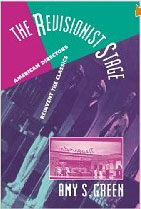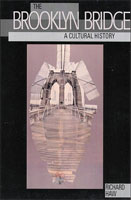Faculty Bookshelf
The Revisionist Stage (Cambridge University Press, 1994)
Amy S. Green

The Revisionist Stage explores the vision and talents of a controversial group of artists who, depending on one's perspective, either revitalized or disfigured the standard dramatic repertoire by adapting canonical dramas for the contemporary American stage. Amy S. Green's critical history features the bold directorial ventures of JoAnne Akalaitis, Lee Breuer, Liviu Ciulei, Richard Foreman, Joseph Papp, Lucian Pintilie, Richard Schechner, Peter Sellars, Andrei Serban, Robert Woodruff, and Garland Wright. Green covers Greek and Roman drama, plays by Shakespeare and Molière, and the operas of Mozart and da Ponte, and discusses in detail many landmark theatrical events of the past thirty years. This versatile, insightful study provides an informed reading of the business of theatrical revision, and a full-scale investigation of this rich and controversial genre.
"...The Revisionist Stage is a useful and important book. It is an essential guide to the theory and practice of performing classic plays in the late twentieth century. ...a model of critical openess."
— THJ
"...the book is well written, meets its stated goals, and includes detailed notes and bibliography. It will prove most helpful to those interested in 'bright ideas'."
— M. D. Whitlatch, Choice
"...Amy S. Green has taken on a sizable task with apparent ease and much grace...[an] insightful look at some of the most noteworthy U.S. productions of the past three decades. Green's work is both theoretically and historically grounded and her excellent synthesis of wide-ranging materials into highly evocative descriptive prose contributes significantly to the body of information available about the theatre of this period in the U.S."
— Linda Miles, Theatre Insight
"...the book is a worthwhile addition to the study of production."
— Arnold Aronson, American Studies
The Brooklyn Bridge: A Cultural History (Rutgers University Press, 2005)
by Richard Haw

"In the most important work on the Brooklyn Bridge in a generation, Richard Haw shows how and why it remains a central but contested American icon."
— David E. Nye, author of America as Second Creation: Technology and Narratives of New Beginnings
"Absorbing and provocative, Richard Haw sells you the great bridge in a thousand incarnations."
— Kevin Baker, author of Dreamland and Paradise Alley
Art of the Brooklyn Bridge: A Visual History (Routledge, 2008)
by Richard Haw

"Richard Haw's book is an ecstatic ode to the Brooklyn Bridge, which we all know is so much more than its 14,680 tons of wood, stone and steel. Its all in here: the builders and bigwigs, the Roeblings and the riggers, the jumpers and joggers, the painters and poets. Rare images and fascinating text memorialize the odd jumble of characters without whose brains, brawn, and chutzpah the bridge might never have been built. This marvelous book shows why we say Brooklyn is the place where legends are made and dreams come true."
— Marty Markowitz, Brooklyn Borough President
"Art of the Brooklyn Bridge is an elegant structure, which takes you to another shore and along the way offers unparalleled views. Richard Haw's beautiful book is about one of the worlds great bridges, but also all about the city that makes it great."
— Russell Shorto, author of The Island at the Center of the World
"Richard Haw's magically illustrated cultural history of the Brooklyn Bridge is a most welcome celebration of one of the greatest engineering achievements of all time. Art of the Brooklyn Bridge is a visual and literary delight."
— Henry Petroski, author of Engineers of Dreams
"Richard Haw's Art of the Brooklyn Bridge is irresistible. Delightfully written, it presents a fascinating gallery of characters associated with the Bridge through its history. But the book is much more than that. It is packed with rarely seen and many never published images of the Bridge, from newspaper and magazine engravings, to movie posters, to major paintings and some of the most compelling photographs of the Bridge I have ever seen. Haw is a wonderful story teller and he is blessed with an eye for the humorous as well as the aesthetic. He reveals the Bridge as an icon, muse, and obsession for New Yorkers."
— Thomas Bender, Department of History, New York University
"Richard Haw is our greatest chronicler of the Brooklyn Bridge. He has dug deeper than the usual treatment of the bridge as technological triumph and cultural icon to see it as a psychological fact and witness to changing times, as represented by the stunningly varied artists and photographers drawn to the bridge. This book is also the most compelling compilation of Brooklyn Bridge images I have ever seen."
— Francis Morrone, author of An Architectural Guidebook to Brooklyn
Deceit and Denial: The Deadly Politics of Industrial Pollution (University of California Press, 2003)
by Gerald Markowitz and David Rosner
“This ably written book makes a strong case for a precautionary approach toward the regulation of toxic hazards.”—The Lancet
"Provides a most readable narrative history. . . . Even for those unfamiliar with the players, this is a riveting account that can convey a better understanding of the complex influences of corporate-government interactions and the cost to health."—Jama
“An important work...a wonderful depiction of the difficulty of combating a well-funded corporate culture.”—Brian Black Enterprise & Society
“Like any solid work of history, Deceit and Denial stands on the strength of its evidence and argument. Rosner and Markowitz marshal a devastating case, an the overarching question of culpability gives their account a narrative power and an analytical precision too often missing in historical scholarship.”—Reviews In History
“The authors . . . write authoritatively and persuasively, marshaling an impressive array of sources. A strength of this book is that it raises numerous issues related to the manufacture and marketing of potentially toxic products. The book has potential as a text.”—Hugh S. Gorman Technology And Culture
"Deceit and Denial...lays bare the truth about how every one of us in America is imperiled when powerful corporations forsake their responsibility to the public health. Rosner and Markowitz have combined the skills of historical research, investigative journalism, and scientific analysis to tell a story that should shake an industry and alert a nation."—Bill Moyers
"Deceit and Denial is a real public service in reminding all of us that fundamental to protecting our air, water, and the health of our communities and families is the public's right to know."—Carol M. Browner, Administrator, Environmental Protection Agency, 1933-2001
"This is an especially important book at a time when industry is increasingly sponsoring risk research, and 'voluntary' evaluation is the norm. And it is all the more important at a time when new bio-engineered products are being marketed with little understanding of long-term clinical and subclinical risks."—Dorothy Nelkin, coauthor of The DNA Mystique: The Gene as Cultural Icon and Body Bazaar: The Market for Human Tissue i nthe Biotechnology Age
"In this time of community health crises, appalling environmental disasters, and political dismay, Gerald Markowitz and David Rosner have given us an urgently needed, galvanizing, hopeful history of triumphant public activism against the greatest odds. In the face of corporate cruelty and lies, labor and community activists, lawyers, and historians stopped polluters and saved countless lives. This vivid, splendid book floodlights past abuses as it charts the road toward a healing, safer future."—Blanche Wiesen Cook, author of Eleanor Roosevelt
Lead Wars: The Politics of Science and the Fate of America's Children (University of California Press, 2013)
by Gerald Markowitz and David Rosner
“In Lead Wars, CUNY’s Gerald Markowitz and Columbia University’s David Rosner convincingly show that the Baltimore toddler study emerged from a century of policymaking in which the US government, faced at times with a choice between protecting children from lead poisoning and protecting the businesses that produced and marketed lead paint, almost invariably chose the latter.”—New York Review of Books
“Lead Wars clearly shows that the scandalous and tragic history of lead is one that our society is doomed to repeat over and over again unless we develop and fight for better safeguards against chemicals and new technology.”—Helen Jupiter Mother Nature Network
“A fascinating new book.”—Howard Markel PBS Newshour The Rundown Blog
"Thoroughly researched and clearly written, this book does an excellent job of illustrating the problem society encounters when science and industry face off over likely harm versus economic benefit."—Richard Maxwell Library Journal
"A deeply conceived and well-written book by two of America's best public health historians. It's also an important background briefing on the politics and ethics of scientific research for journalists who will be covering environmental health issues like these."—Bill Kovarik SE Journal
"Chronicles the monstrous irresponsibility of companies in the lead industry over the course of the 20th century."—Nicholas D. Kristof New York Times
"I want to thank David Rosner and Gerald Markowitz for what that they've done to bring the story of the lead paint wars to the public."—Senator Sheldon Whitehouse
"The prolific team of Gerald Markowitz and David Rosner has done it again. Lead Wars: The Politics of Science and the Fate of America’s Children is a thoroughly researched, passionate, and gripping history of a major public health problem. . . . Lead Wars challenges us to take better care of our children by fighting those industries that appear to regard them—especially poor black and Latino children—as disposable."—Elizabeth Fee Health Affairs
“The story Rosner and Markowitz tell of generations of children gravely damaged by promiscuous dispersal of lead, and the persistent attempts made to evade responsibility for the harms caused, is both true and shocking. This book will not just educate future environmental and health leaders, it should outrage them.”—Richard J. Jackson MD, MPH, Professor and Chair, Environmental Health Sciences, UCLA Fielding School of Public Health
"Lead Wars argues that the tragedy of lead is one that our society is doomed to repeat again and again unless we develop better safeguards to protect us against chemicals and new technology. This book is a "must read" for public health professionals as well as for political scientists, social historians and for all who care about the future of America's children."—Philip J. Landrigan MD, Ethel H. Wise Professor of Community Medicine and Chairman in the Department of Preventive Medicine at the Mount Sinai School of Medicine
"Can being poor justify differing standards for research or a focus merely on harm reduction and the politically feasible? Markowitz and Rosner make the compelling case that in public health the practical and possible may in the end be immoral and dangerous, and a consequence of the war on science. A necessary read for anyone who cares about public health, the role of government, children, medical experimentation and environmental justice."—Susan M. Reverby, McLean Professor in the History of Ideas and Professor of Women's and Gender Studies, Wellesley College
“Lead poisoning remains a tragedy (and scandal) of immense proportions, and the authors utilize new sources—including previously unexamined court records—to tell a story that is as gripping as it is important.”—Robert N. Proctor, Professor of the History of Science at Stanford University and author of Cancer Wars
"This book tells the story of a public health tragedy affecting millions of children, the determined doctors who tried to help, and an industry propaganda campaign which prolonged and worsened the tragedy. For as long as powerful corporations manipulate politicians and public opinion to profit from dangerous products, this will remain an important story for our country."—Sheldon Whitehouse, United States Senator
Lead Wars makes clear the public health dangers we face if we continue to ignore this corporate strategy that defines “acceptable” levels of risk for the thousands of chemicals in use. It brings home the importance now more than ever of taking a precautionary approach to managing toxic chemicals. This book is a must for any activist who wants to understand the strategies polluters use to continue business as usual. —Lois Marie Gibbs, Executive Director, Center for Health, Environment & Justice
"In this outstanding book, Gerald Markowitz and David Rosner utilize historical scholarship to expose a major tragedy in recent public health: the failure to protect children from the harms of lead in our environment. Despite the fact that the toxic effects of lead have been known for centuries, they show—using previously unavailable documents—how the lead industry has protected their profits at public expense, despite their explicit knowledge of its many dangers. Lead Wars brings this tragic history to light in a narrative that integrates deep investigation and analysis with compelling advocacy and compassion for children who continue to be at risk from one of the world’s best-known toxins."—Allan M. Brandt, Professor of the History of Medicine at Harvard University, and author of The Cigarette Century: The Rise, Fall, and Deadly Persistence of the Product That Defined America
"Markowitz and Rosner have majestically woven the key characters and elements of the history of lead poisoning into a captivating narrative that exposes a tremendous and terrifying truth; unless it serves the needs of private enterprise, public health is incapable of controlling the causes of chronic disease and disability. In place of prevention, we have settled for partial solutions. Everyone who has an interest in public health, health policy or history should read this book."—Bruce Lanphear, MD, MPH, Clinician Scientist, Child & Family Research Institute BC Children’s Hospital and Professor of Health Sciences, Simon Fraser University, Vancouver, BC
Creating Bodies: Eating Disorders as Self-destructive Survival (The Antalytic Press, 2007)
by Katie Gentile
“From its title to its final word, Katie Gentile’s book is an enormous, undeniably original adventure. How many psychoanalytic books can we say that about? She analyzes the lifelong diaries of a woman who is otherwise unknown to her. In the course of this analysis, which entails not only conventional psychoanalytic interpretation but also close observation of how the diary’s words are laid out on its pages, Gentile mines new understandings of the impact of trauma on the experience of time and space. For Gentile to offer us this novel way of thinking and writing as her first book took real courage. She was right to do it. It works. Read it.” - Donnel Stern, Editor, Contemporary Psychoanalysis
"Katie Gentile’s psychoanalytic page-turner – part case study, part literature, part personal narrative – inhabits an intersubjective space that draws and invites us in. The resulting unity of reading experience issues from the author’s calm acceptance of paradox, of the discontinuities and ruptures that propel her subject’s struggle to create coherence by transforming her corporeality – her eating, her body, her sex – into a text. Gentile’s transparent, deeply reflective voice generates a polylogue in which she engages with her subject, her multiple disciplines, herself, and her readers. Don’t miss it!" - Muriel Dimen, Author of Sexuality, Intimacy, Power
"In many ways, this book is a very brave project. The subjectivity of the author is touched by her subject, Hannah, via the texts, in a way that is both distant and intimate. The author makes skillful use of extensive theoretical exploration and develops this novel concept of temporality to build a case for the healing power of being aware of how experience at different points in time is linked. Gentile's discoveries offer an important contribution that can inform a more respectful and attuned approach to treating trauma and eating disorders." - Theresa Fassihi, Bulletin of the Menninger Clinic
"Creating Bodies is a highly original and insightful exploration of the relationships between the body and the mind, the body and food, and textual and corporeal bodies. Through her empathic collaboration, frustration, and desire to know Hannah, Gentile produces a persuasive version of events and their effects, creating temporal links between Hannah's traumatic past and her present. Gentile's analyses of these texts reveal how Hannah's need to reconnect with her abusive history and thrive, rather than merely survive, is achieved through a reading and writing process in which power is carefully negotiated." - Rhona O'Brien, Feminist Theory
"Creating Bodies...brings to the table some extremely important concepts that are often missing from general discussions of eating disorders. All in all, this book is a useful reading experience for those clinicians who are trying to understand people who struggle with eating disorders." - F. Diane Barth, Clinical Social Work Journal
"By challenging herself to know, Gentile challenges us to think. With the anchor of her stimulating and incisive mind, questions abound in many directions. Only rarely does a book allow for such a varied journey. Creating Bodies promises an adventure filled with a provocatively pitched balance between the answers it gives and the questions that remain. For this experience of thought alone, the book is well worth its challenge." - Judith Brisman, Contemporary Psychoanalysis
Why Arnold Matters: The Rise of a Cultural Icon (Basic Books, 2004)
by Michael Blitz and Louise Krasniewicz
After nearly thirty years in the public eye, Arnold Schwarzenegger's rise to fame and fortune--and statesmanship--represents a celebrity the likes of which we've never seen before. As co-authors and longtime collaborators Blitz and Krasniewicz argue in this humorous but heady book, it is not just a matter of his transformation from bodybuilder to megastar to politician. Nor is his governorship of California just a matter of another actor assuming the position. Instead, at the beginning of the 21st century, "Arnoldness" has spread into every corner of our culture. More than a name, more than a spectacular career, he has become a set of ideas--an ultramodern take on the quintessential American dream.Having followed the cult of Arnold for twenty years, Blitz and Krasniewicz are uniquely qualified to illuminate his growing hold on our collective imagination. As an adjective, as a metaphor, as an easy reference point for anyone talking about things tough, forceful, and successful, they'll explain exactly why Arnold matters--and for better or worse, richer or poorer, America may never be the same.
Contact Us
scrowder@jjay.cuny.edu or aperez@jjay.cuny.edu
Visit
6.65 New Building
Call
212.237.8460